Debt Settlement Vs Bankruptcy in Indiana
by Attorney S. Zachary T. Brock
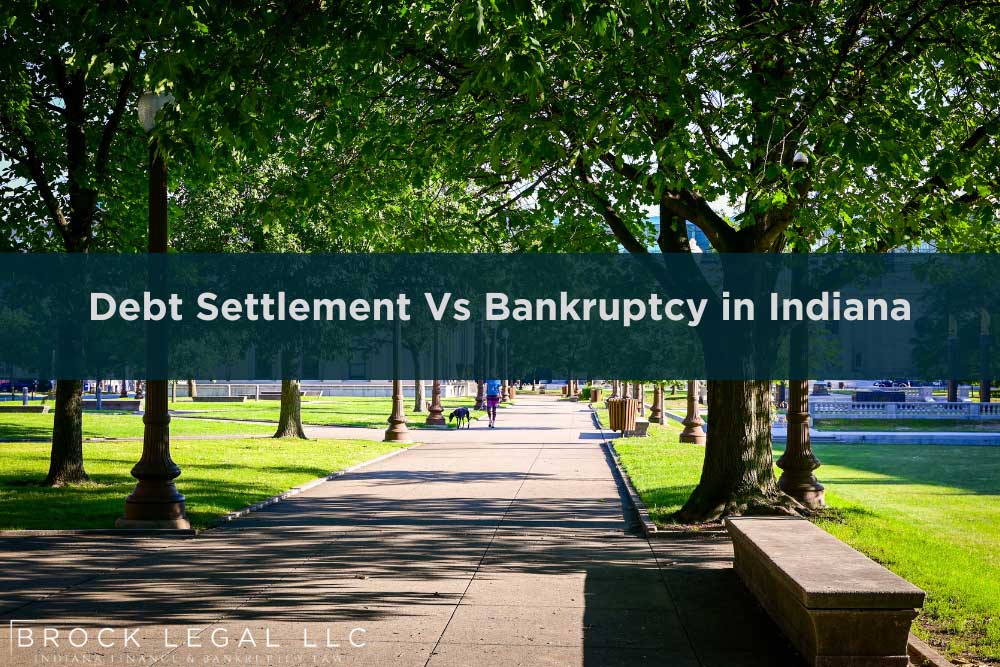
Table of Contents
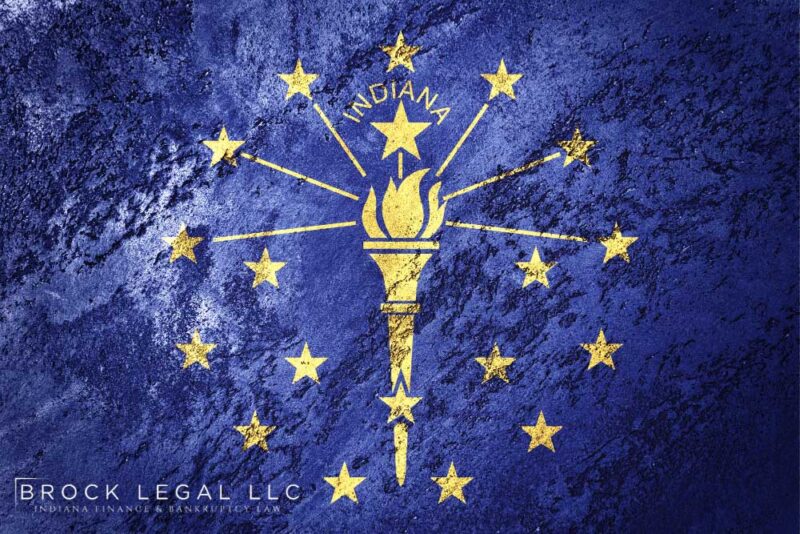
Introduction
Navigating the murky waters of financial hardship requires courage, resilience, and informed decision-making. For residents of Indiana grappling with the heavy burden of overwhelming debt, the path to financial freedom may seem fraught with obstacles and uncertainties. Whether it is due to unforeseen medical expenses, loss of employment, or other personal crises, finding oneself in a deep financial quagmire can be a profoundly distressing experience for any individual or family.
Choosing the best course of action for rebuilding financial stability is no small task. It requires a thorough understanding of one’s financial landscape, as well as a clear grasp of the legal implications and long-term consequences associated with each option. Debt settlement, with its promise of negotiating debt down to a more manageable amount, appeals to those looking to avoid the stigma and long-term credit impact of bankruptcy. On the other hand, bankruptcy, whether through liquidation (Chapter 7) or reorganization (Chapter 13), provides a structured, court-supervised pathway to debt relief, complete with legal protections against creditors.
This guide is designed to demystify the pros and cons of both debt settlement and bankruptcy in Indiana. Our aim is to arm you with the knowledge you need to navigate these options with confidence. By understanding the benefits and drawbacks of each, as well as the specific considerations pertinent to Indiana law, you’ll be better equipped to make a decision that aligns with your financial goals and personal values. We’ll explore the intricacies of debt settlement negotiations, the rigorous processes of Chapter 7 and Chapter 13 bankruptcies, and how each option affects your financial future. With this information in hand, individuals and families can take the first steps towards reclaiming their financial stability and embarking on a path to recovery.
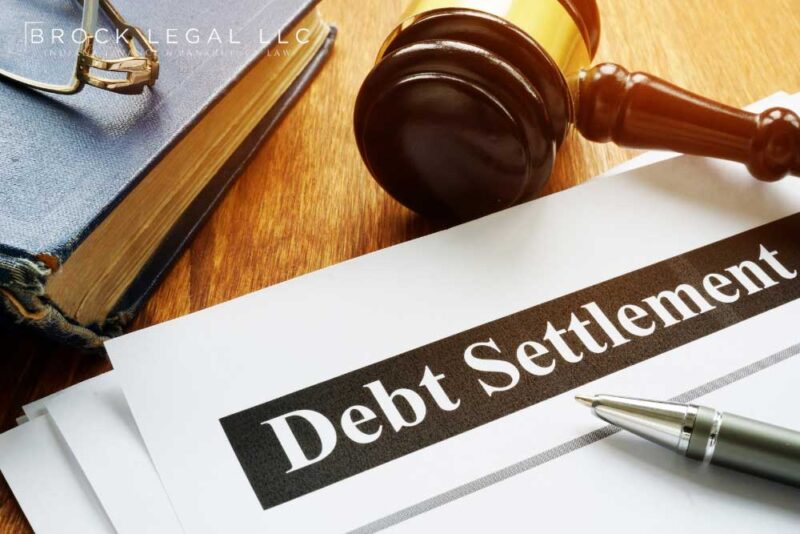
Debt Settlement in Indiana: An Overview
Debt settlement represents a financial strategy aimed at reducing the total amount of debt owed through direct negotiation with creditors. This approach allows debtors to offer a lump sum payment that is typically less than the full amount due in exchange for the creditor’s agreement to consider the debt fully satisfied. The allure of this method lies in its potential to lessen the financial burden on the debtor without resorting to bankruptcy, which can have a more severe and lasting impact on an individual’s credit score and overall financial standing.
Engaging in the debt settlement process is complex, nuanced and requires a careful assessment of one’s distinct financial situation. While some individuals feel confident in their ability to negotiate with creditors directly, others may opt to employ the services of a professional debt settlement company. These are companies that act on behalf of the debtor, leveraging their expertise and understanding of debt laws to secure the best possible outcome for their clientele. However, it is essential to approach employing such services with caution, as there may be hidden fees, lasting impacts on credit score, and potential for scammers to take advantage if you are not careful and thorough.
For Indiana residents considering debt settlement, it is critical to understand your state’s specific legal landscape and how it may influence the negotiation process. State laws and creditor policies can significantly impact the likelihood of reaching a favorable settlement. Additionally, it is important to consider the tax implications of debt forgiveness, as settled debts can sometimes be viewed as taxable income by the Internal Revenue Service. Consulting a law professional in Indiana will help to alleviate some of these concerns and answer specific questions regarding debt settlement in your home state.
Debt settlement may seem like an attractive alternative to the more drastic step of filing for bankruptcy, offering an expeditious and minimally invasive way to address overwhelming debt; however, it is essential for those exploring this option to weigh the potential benefits against the risks carefully, including the lasting effect this process may have on credit reports and the possibility of legal action from creditors unwilling to negotiate.
Pros of Debt Settlement:
Avoid Bankruptcy: The most significant advantage is avoiding bankruptcy, which can have a lasting impact on your credit report for up to 10 years.
Reduce Overall Debt: Debt settlement can result in paying off debt for a fraction of what is actually owed, potentially saving you significant amounts of money overall.
Quicker Resolution: Depending on the amount of debt owed and the willingness of creditors to negotiate, debt settlement can resolve debts faster than the bankruptcy process.
Cons of Debt Settlement:
Impact on Credit Score: Settling debt typically requires falling behind on payments, which may negatively affect your credit score.
Tax Implications: Forgiven debt totalling over $600 may be taxable as income, which can lead to a tax liability.
No Legal Protection: Unlike bankruptcy, debt settlement offers no legal protection against creditors and collection actions can continue throughout the process.
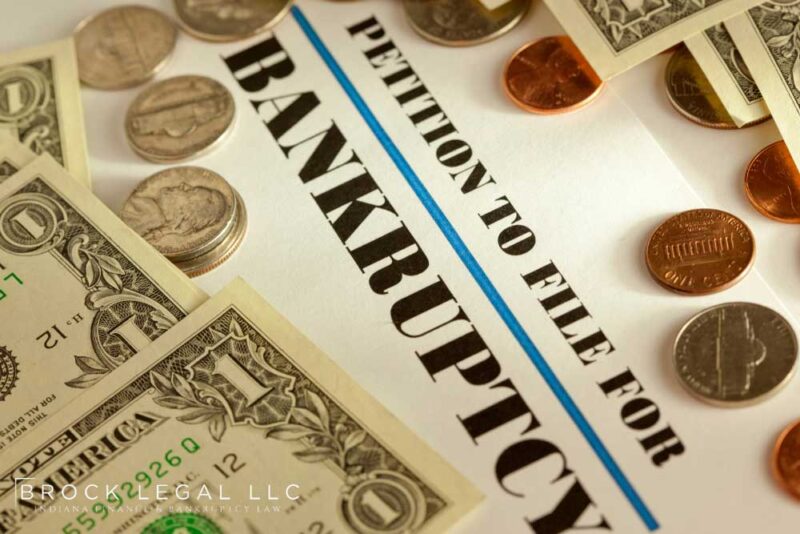
Bankruptcy in Indiana: An Overview
Bankruptcy stands as a legally sanctioned method for individuals or businesses in Indiana facing insurmountable debt to seek relief and a fresh financial start. The U.S. Bankruptcy Code provides two primary avenues for personal bankruptcy: Chapter 7, which focuses on the liquidation of assets to discharge debts, and Chapter 13, which allows for the reorganization of debts and the establishment of a repayment plan tailored to the debtor’s income. Both forms of bankruptcy are designed to offer a reprieve from the relentless pressure of debt collection, but they come with distinct processes, requirements, and outcomes that reflect the debtor’s financial situation and objectives.
Initiating the bankruptcy process involves the meticulous preparation and submission of legal documents to the court. Such documents and submissions include filing a petition, drafting a schedule of assets and liabilities, a statement of financial affairs, and in the case of Chapter 13 bankruptcy, a detailed repayment plan proposal. This paperwork provides a comprehensive overview of the debtor’s financial status, thus offering the court necessary information to make informed decisions regarding the case.
For those pursuing Chapter 7 bankruptcy in Indiana, the process typically involves the appointment of a bankruptcy trustee who evaluates the debtor’s assets to determine which can be liquidated to satisfy creditors. Certain personal assets may be exempt from liquidation under state or federal laws, allowing debtors to retain essential property such as a primary residence, automobile, and personal belongings up to specific values. The goal of Chapter 7 is to enable individuals to eliminate many types of unsecured debts, such as credit card debt and medical bills, thereby offering a clear pathway to financial recovery.
Chapter 13 bankruptcy, conversely, does not primarily focus on asset liquidation but instead on restructuring the debtor’s finances into a more manageable form. Under this chapter, debtors propose a repayment plan to make monthly payments to creditors over a period of three to five years, based on income, living expenses, and total debt amounts. This option is particularly beneficial for those seeking to avoid foreclosure on their home, make up for missed loan payments, and restructure other debts under court supervision.
The decision to file for bankruptcy is significant and carries long-term financial implications, including potential impacts on credit score, future loan eligibility, and personal or business reputation. For Indiana residents considering bankruptcy, it is crucial to understand not only the procedural aspects of filing and the differences between Chapter 7 and Chapter 13, but also the broader consequences of making such a decision. Navigating the complexities of bankruptcy law and determining the most suitable path requires careful analysis and, often, the guidance of an experienced bankruptcy attorney who can provide personalized advice based on an individual’s unique financial circumstances. For a more complex examination of filing Chapter 7 vs. Chapter 13 Bankruptcy, read here.
Pros of Bankruptcy:
Immediate Automatic Stay: Filing for bankruptcy provides an automatic stay, immediately stopping most collection actions against you. This may include creditor calls, letters, wage garnishments, and foreclosure proceedings.
Debt Discharge or Reorganization: Chapter 7 allows for the discharge of many types of unsecured debt, while Chapter 13 offers a way to reorganize debts into a manageable repayment plan.
Fresh Financial Start: Bankruptcy can provide a clean slate, allowing debtors to rebuild their financial health without the overwhelming burden of insurmountable debt.
Cons of Bankruptcy:
Long-term Credit Impact: A bankruptcy filing remains on your credit report for 7-10 years, making it difficult to obtain new lines of credit and short-term loans.
Public Record: Unlike debt settlement, bankruptcy is a matter of public record, which some individuals and families may find embarrassing or stigmatizing.
Asset Liquidation: In Chapter 7 bankruptcy, you may have to liquidate certain assets to repay creditors, although exemptions do exist to protect essential property.

Debt Settlement or Bankruptcy in Indiana: What is the Right Choice?
Making the decision between debt settlement and bankruptcy involves several considerations, including:
The Amount of Debt You Have: Significant debt may be more effectively managed through bankruptcy.
The Types of Debt You Have: Certain debts, like student loans, are rarely dischargeable in bankruptcy, making debt settlement a more appealing option for these types of obligations.
Your Unique Financial Goals: If maintaining a higher credit score is a priority, debt settlement might be preferable for you despite the distinct challenges associated with it.
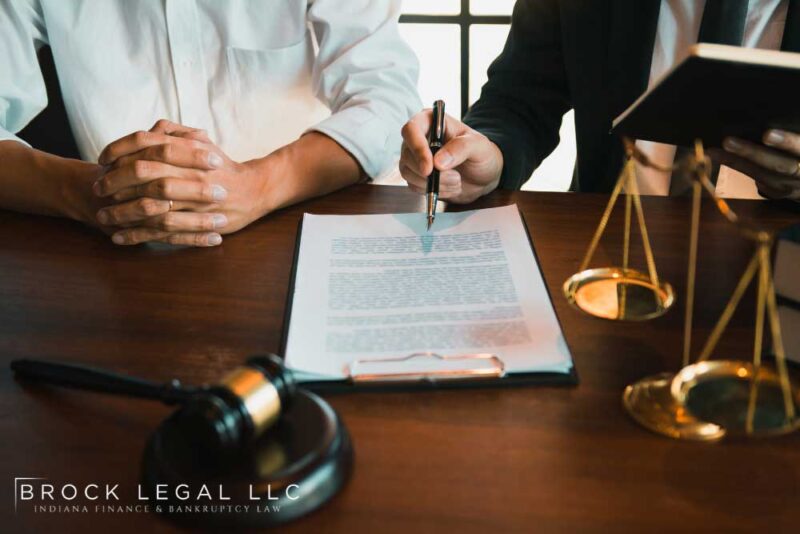
The Importance of Legal Guidance
Regardless of the path you choose to pursue, it is imperative that you seek professional legal guidance for this process. As an experienced Indiana attorney, Indy Finance Law can offer you:
Personalized Advice: At Indy Finance Law, we will conduct a thorough review of your financial situation to recommend the best course of action based on both your current finances and future goals.
Negotiation Support: Indy Finance Law is experienced in negotiating with creditors should you choose debt settlement as the proper course of action for your financial situation.
Legal Representation: Indy Finance Law is knowledgeable and prepared for court should you choose to file for bankruptcy. We will ensure your rights are protected throughout the duration of the process.

Conclusion
Both debt settlement and bankruptcy offer viable pathways out of financial distress. Each option is not without its own unique set of advantages and disadvantages. The decision between the two should be made with a comprehensive understanding of one’s own financial situation and long-term objectives. In Indiana, individuals considering these options should consult with a knowledgeable bankruptcy attorney to navigate these complex decisions effectively. Experienced and professional legal guidance not only offers an approach tailored to an individual or family’s distinct circumstances, but also ensures that the chosen path aligns with their unique financial recovery goals.
As you consider your next steps towards financial stability, remember that the journey to overcoming debt is a marathon, not a sprint. Whether through debt settlement or bankruptcy, the goal is to find a solution that offers you a sustainable financial future. Contact Indy Finance Law today for a free consultation to find out more.
FAQs On Creditor Harassment in Indiana
Consulting with a bankruptcy attorney is crucial for understanding your rights and the best course of action for your specific situation. An attorney can guide you through the bankruptcy process, ensure creditors adhere to the automatic stay, and advise on potential FDCPA violations. They play a key role in protecting your rights and providing peace of mind during a challenging financial period.
If a creditor violates the FDCPA, you may have grounds to sue for damages, including emotional distress, lost wages, and attorney’s fees. Indiana’s state laws also provide additional protections, and a violation of these can lead to further legal recourse.
Once you file for bankruptcy, the automatic stay prohibits debt collectors from contacting you. Any further communication or collection efforts by creditors must go through the bankruptcy court or your attorney. Violation of this stay can result in legal consequences for the creditors.
Chapter 7 bankruptcy, often a liquidation process, discharges most unsecured debts and halts creditor actions through the automatic stay. Chapter 13, a reorganization form of bankruptcy, allows you to repay debts over time while keeping your assets. Both forms provide an automatic stay, but Chapter 13 typically involves a structured repayment plan over 3-5 years.
Filing for bankruptcy in Indiana triggers an automatic stay, which is a legal injunction that stops all collection efforts by creditors immediately. This includes halting phone calls, letters, lawsuits, and wage garnishments, offering significant relief while you work towards resolving your financial situation.
Creditor harassment in Indiana includes repeated and aggressive communication tactics like excessive phone calls, especially outside reasonable hours, use of abusive language, making false claims about debts, or threatening illegal actions. It also encompasses any behavior that violates the Fair Debt Collection Practices Act (FDCPA) or Indiana’s specific debt collection statutes.
Attorney S. Zachary T. Brock

Attorney S. Zachary T. Brock
Zach empowers individuals faced with financial challenges by providing them with effective solutions and unwavering support in the areas of consumer finance and bankruptcy law.
By actively listening and empathizing with each client, Zach works to gain a deep understanding of every individual or family’s unique circumstances. This helps him tailor his legal strategy to best meet the needs of each client.
“No matter what may be weighing you down financially, Brock Legal is here to help. My mission is to help navigate you through whatever stressful circumstance you may be faced with, by offering unparalleled education and service in the areas of consumer finance and bankruptcy law. Let us show you how our firm can help. Contact Brock Legal today!”
-Zach



